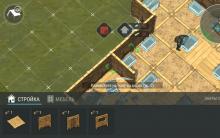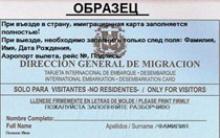The first stage in the organization of a role-playing game is a theoretical development, which includes the following points:
1. Picture of the simulated world;
2. The rules of the game;
3. Team and (or) individual injections.
The entire course of the game depends on how well thought out this data package is.
1. Picture of the simulated world
Here it is necessary to present the conditions and laws of existence of the modeled world. The more fully and vividly it will be described, the more varied and thoughtful the actions of the players will be. The description scheme is as follows:
A) the place of action;
B) duration of action;
V) characters and their position;
G) important events preceding the simulated period
Time;
E) the situation at the beginning of the game.
2. Rules of the game 
The rules are the main Law of the game, therefore, their development must be carried out with legal scrupulousness, in order to avoid different interpretations. The main sections of the rules that apply in most games are:
A) military sphere:
Norms for types of weapons and fortifications,
Military actions,
Safety engineering;
B) the political sphere:
The political structure of the simulated world,
Modeling social relationships,
Modeling political and legal activities;
C) economic sphere:
Orientation of the economy,
Modeling of branches of economic activity,
Modeling of financial and economic activities;
D) physical and metaphysical laws of the simulated world:
Structuring time,
Moving around the playing area,
Magical abilities, 
Magic characters and items;
D) the spiritual sphere:
Culture (traditions, customs, art),
Religious cults of the simulated world.
3. Team and individual introductory
Team and individual introductions are developed by the organizers of the game, or by the players themselves, in agreement with the organizers. Introductory introductions help participants better understand their role, define their place in the simulated world, and outline a line of behavior. Team and individual injects should contain the following information:
Command Introductory:
A) the name of the team (group, people, country);
B) Team Legend:
Origin,
Important historical events,
Legends, traditions,
Rites, religion,
Team secrets;
C) command structure:
Control,
Social composition,
Relationships between layers and team members;
D) the relationship of the team with others:
Friends,
Neutral forces;
E) the goals of the team in the game.
Individual introductory notes:

A) play name;
B) age;
C) official biographical data;
D) the current position in society;
E) attitude towards others;
F) items and personal secrets;
G) game information;
H) goals in the game.
"Role play method in training"
 Role play method in training is one of the basic ones, it is used in most trainings of any orientation and for any audience.
Role play method in training is one of the basic ones, it is used in most trainings of any orientation and for any audience.
Role play
This stage is the most interesting for the participants and the most difficult for the facilitators. No matter how complete and all-embracing the picture of the simulated world is, no matter how good the rules and preparation of the players are - all the same, the conduct of the game requires a lot of physical and intellectual exertion from the hosts. 
When playing a game, the presenter must regulate its course, monitor compliance with the rules and act as an arbiter when controversial situations... Most often, it is necessary to service the game by several hosts, especially when conducting large-scale games. In this case, the unanimity and competence of the leaders in the interpretation of the rules and the picture of the world are important. The authority of the leader must be indisputable.
To conduct large-scale games, it is necessary to have a main presenter or coordinator who has a permanent place of residence and controls the entire course of the game; regional leaders supervising certain areas of the playing area; and a group of game technicians who influence the course of events according to the instructions of the presenters.
Depending on the requirements of the game, the presenters can have individual roles or be outside the game. Their main task is to maintain the dynamism of events. On the other hand, a single team or player should not be allowed to exert strong pressure when the bulk of the players cannot withstand the tough pace of the game. In these cases, it is necessary to establish the cause of overlaps and restore the normal course of events by introducing new game factors or organizing forceful intervention.
Constant monitoring of compliance with the rules is required. Any violation of them must be punished immediately and effectively. For particularly gross or systematic violations, it is possible to remove a player from the game. Naturally, it is necessary to balance the violation committed and the punishment imposed.
When conducting a game, it is important to organize well-functioning information support for the presenters throughout the game. Full awareness of the current events will help to correctly regulate the course of the game and prevent the occurrence of emergency situations. 
Abnormal situations arise when conducting even a well-organized game. Players can find inconsistencies in the rules, come up with an extraordinary move or break the rules. In any case, the first step is to regain control over the situation. Players often try to put pressure on the hosts and seize the initiative. This should not be allowed. The presenters must understand the situation in detail and check it for compliance with the rules and the picture of the world. If the question is above the competence of the regional leader, it is necessary to urgently contact the coordinator in order to avoid misunderstandings.
In conclusion, it is worth noting that it is necessary to strive to minimize the forceful regulation of the game, which causes a painful reaction in the players, and in the case of a systematic use of forceful methods, it can lead to hostility towards the leaders. One should strive to incorporate regulatory elements into the development of the game. The main task of the presenters is to make the game interesting for the players.
"Corporate business games. Methods of development and implementation"
 The book presents exclusive material based on 16 years of practical experience of the author... All the necessary tools and complete scenarios of two corporate business games, the practical implementation of which began in 2001, are given.
The book presents exclusive material based on 16 years of practical experience of the author... All the necessary tools and complete scenarios of two corporate business games, the practical implementation of which began in 2001, are given.
The book is recommended for business trainers, organizational change consultants, HR managers, heads of enterprises of all forms of ownership and types of activity as a tool for solving problems of team building, comprehensive assessment of personnel, their training and development.
The book contains all the necessary tools for conducting and analyzing a corporate business game. Game scenarios are as close as possible to business reality and involve all participants in the gameplay, from the beginning to the end of the game. Recommended!
Play is the leading activity of a junior schoolchild. It is in the game that many important life skills are trained, character traits are formed. V primary school play is the main way a child has a social experience. The leading role in this belongs to the role-playing and business games. Their form involves an impromptu enactment of a certain situation. Moreover, in most cases, the child during these games plays the role of an adult. Why do you need to conduct role-playing and business games in primary school? What role-playing games can be done in elementary school?
By engaging in such activities, schoolchildren have to:
- perform various social roles;
- express different civic positions;
- organize or influence the actions of other participants;
- establish communication links, establish contacts;
- solve conflict situations that have arisen during the game.
During the game, a relaxed atmosphere is established. Its organic course includes natural command and submission, which children do not perceive aggressively.
Role play as a means of developing communication skills
Communication in the game is spontaneous, schoolchildren have to develop a model of behavior that involves the formation of the following communication skills:
- willingness to cooperate;
- tolerance;
- tolerance for other people's opinions;
- the ability to conduct a dialogue;
- the ability to find a compromise solution.
In the process of play, such relationships are established between children, which they then reproduce in real life... Children learn such techniques and rules of communication, which they can use in the future in similar life situations. Replaying the situation several times gives the students the opportunity to change roles, try other options for behavior, and conduct.
Mental development of children
A huge role is played by play activity for the process mental development children. The emotional component is also important. gameplay, because the most vivid trace in our memory is left by precisely those events that hurt our feelings, cause a strong emotional reaction.
Thus, play activity enables the child to gain invaluable personal life experience in the most comfortable conditions for him. It can be called a creative laboratory for self-education, a “school of life” for a child.
The essence and structure of a role-playing and business game
Role-playing and business games are of a social nature. Their essence lies in the artificial immersion of children in conditions that are possible in real life. The main thing in conducting such games is to give children the opportunity to show initiative, to present their model of social relations.
Younger students already have an idea of how adults behave in similar situations. Therefore, despite the proposed freedom of action, in most cases children try to copy their behavior. The task of the game organizer is to push the children to search for their own options for behavior, non-standard solutions to emerging problems.
The structure of this type of game is quite controversial. On the one hand, during the game, the child should feel absolutely free. On the other hand, the course of the game is strictly regulated:
- the range of roles that schoolchildren should play has been determined;
- the conditions and environment in which the imaginary events take place are indicated;
- the rules of the game that must be followed are described;
- there are moral and ethical guidelines that participants must use.
What is RPG?
Role-playing games are always a game of "something" or "someone". The basis of such a game lies in the content of the roles that children must "try on" for themselves. The following types of roles are possible:
- specific adults or children;
- a representative of a certain type of profession;
- family roles;
- ethnographic;
- the role of fabulous or literary heroes.
Each child must fulfill his role only within the framework game action, which can be directed to:
- objective recreation of the content of the activity;
- building a system of relations between people in the course of activities.
Types of role-playing games in elementary school
A distinctive feature of role-playing and business games is the presence of a plot. You can use the following types of plots:
- creative;
- related to the profession;
- associated with the discovery;
- route, i.e. trips;
- related to art;
- paramilitary;
- fabulous;
- fantastic.
The inclusion of children in a role-playing or business game allows them to go beyond their context of activity, realize the need for interpersonal communication and master the necessary key competencies.
Examples of the use of role-playing and business games in elementary school
Let's look at examples of what role-playing games can be done with younger students. Let's start with those games where it is proposed to play the role of children. The value of such games is that the children are given the opportunity to try out various options, play several models of behavior and, on the basis of this, determine the most optimal and correct one.
Planet of Friends game
First, the teacher invites the children to unite in several groups and describes to them game situation... It will be about an endless space in which there are many planets. Each team is invited to settle on a separate planet. The essence of the game will be to establish life in uninhabited territory. Children, taking turns completing the teacher's tasks, must develop and equip their state. The tasks are as follows:
- Come up with the name of the planet and its inhabitants. Describe how they should look.
- Draw up the rules for living together on the planet.
- Describe what events are happening on the planet.
- Offer options for solving the described situation, if it happened on your planet.

"But what if?" Olga Tikhomirova
After all groups have expressed their options for dealing with such a situation, it is necessary to brainstorm and formulate general rules communication between children.
At the end of the game, it is necessary to invite children to move from a fantastic situation to real events.
Students need to describe:
- what situation they lost;
- what topic you touched upon;
- how the rules expressed during the game can be applied in the life of their class.
Children should articulate and reinforce the rules for classroom communication. You can choose a group of children who will write and draw up these rules, and then attach them in the classroom corner.
Of course, children are most interested in games in which they play the role of adults. Such options are possible.
Game "Zoo"
To conduct such a game, you need to prepare a large amount of inventory:
- figurines of various animals;
- material for the construction of aviaries (construction kit or cardboard boxes can be used);
- natural material to create a park effect;
- box office tickets.
Children must be divided into several groups and the director of the zoo and the cashier must be selected separately. The point of the game is to build a zoo and organize an excursion around it.
First, each group will have to choose an animal to care for. You can do this in any order, by lot, or offer to guess riddles.
While this action is taking place, the director of the zoo must think over the location of each enclosure and draw a schematic map. After distributing the groups, he gives each of them a building material. While the groups are building the enclosures, the director will have to beautifully draw up a map of the zoo and outline the route of the excursion around it.
The main part of the game is that children should not only settle the animal in an aviary, but provide him with care. The children are invited to find information on how to feed their animal, what conditions to create for it. You can set aside two or three days for this and continue the game after the students are ready.
All the information that the children manage to collect will need to be voiced during the virtual excursion. For this, each group chooses its own guide. The rest of the children buy tickets at the box office and go for a walk to the zoo. They all move around the zoo in one group and listen to who lives here near each enclosure.
Such a game can be used in environmental classes. During the game, children will get acquainted with the rules of behavior in the zoo and learn a lot of information about rare animals.
Role-playing games can be held at events dedicated to the study of the Rules of the Road. Road traffic"," I'm going home "," We are at a pedestrian crossing ", etc.
Game "Journalists"
First, the title and the thematic feature of the journal are announced. Among the students of the class is chosen Chief Editor... He can be appointed or determined by a vote of all members of the collective.
You also need to tell the children that there are several thematic departments in the editorial office of the magazine and explain the features of the work of each of them. Schoolchildren should think in which department it will be more interesting for them to work. The assignment to departments can also be done as a full-fledged role-play, when children need to write a job application, go through an interview and receive an appointment order.
After completing all the organizational issues, it is necessary to start imitating the work of the editorial office. Children are offered the theme of the issue and each department must prepare the material and submit it to the press. An editorial board must be selected, which will check the compliance of the material with the topic and design requirements.
The result of such a game should be the release of printed materials. When offering such a game to children, it is worth thinking about its practical significance. Therefore, the topic of the release should be selected in accordance with the studied topic in the classroom or extracurricular activities. The produced magazine should be used at the final collective event. Moreover, it is not enough just to show it, you need to view and analyze each page. In the end, you should thank all the editorial staff and, possibly, "pay" them a salary.
Subject similar games very diverse. You can offer children to work in a confectionery factory, in a pizzeria, in a hairdresser, in a store, clinic or post office. With the help of these games, students will understand the features of each profession.
Examples of games in the classroom in primary grades
Maths
Narrative games on a professional theme may not be so complicated, but reproduce only certain elements of labor activity. For example, in a math lesson, you can invite children to play the game "Fishermen". They get fishing rods, simulate baiting and throw the hook into the water. In turn, the schoolchildren catch fish on which examples are written. After a successful catch, you need to complete the task received.
Russian language
Another example of using a business game in a Russian lesson. This is the Postman game. The postman enters the class and informs him that he has letters for the students of the class. Children receive letters (you can reproduce the situation of receiving a certified letter). Then the students open the envelopes and take out the cards with the assignment for independent work.
We invite a fairy-tale hero
Children enjoy taking part in games with a fairytale or fantasy plot. The easiest way to use such games is to invite a fairy-tale hero to the class, who invites the children to complete his tasks. For example, Dunno may ask you to teach him how to come up with poems. Little Red Riding Hood can distribute pies to schoolchildren with assignments (words with missing letters, terms whose meaning needs to be explained, etc.).
Dramatization
There is also a more complex version of such games. For example, the game "Let's shoot a fairy tale". Children need to get acquainted with the script, assign roles, prepare costumes and scenery. Allow time for rehearsals.
The goal of such a game is not to simply stage the plot of a fairy tale, but to analyze its moral aspect. After the performance, the teacher should invite the students to discuss how they felt in the role of their heroes. Emphasis should be placed on those actions from which children felt awkward, consider them unfair. This conversation ends with the formulation of the correct norms and patterns of behavior.
Role-playing and business games have tremendous potential in developing younger students' readiness for independent activity in real life. Their use in elementary school allows you to captivate children, contribute to their development, reveal talents and individual qualities.
Role play is an interactive method that allows you to learn from your own experience through a specially organized and regulated “living” in a life or professional situation.
Playing a role defined by a scenario, identification (identification) with it helps the student:
1) gain emotional experience of interacting with other people in personal and professionally significant situations;
2) to establish a connection between their behavior and its consequences based on the analysis of their experiences, as well as the experiences of communication partners;
3) take the risk of experimenting with new patterns of behavior in similar situations.
Role-playing games are classified on several grounds.
By purpose, they are subdivided into role-playing games:
- for the diagnosis of personal qualities;
- on the training of social-role behavior (including with elements of psycho- and sociodrama);
- on the development of communicative and organizational qualities.
Depending on the completeness of a given plot, role-playing games are differentiated into games:
- with a poorly defined plot;
- with a sufficiently fully designated plot;
- with a rigidly set plot.
Characteristic features of role play:
- the presence and distribution of roles. Each participant in the role play is assigned a specific role;
- the difference in role goals in solving the assigned tasks. Role-play participants make decisions in accordance with their assigned social roles;
- the interaction of players performing certain roles. It occurs vertically and horizontally;
- the presence of a common goal for the team. The overall goal in the role-playing game is to acquire new knowledge and practice the skills of making conscious responsible decisions in the process joint activities and in interpersonal communication;
- multi-alternative solutions. In a role-playing game, players have to make a decision after analyzing several alternatives, possible options further development situations;
- the presence of controlled emotional stress. It arises due to the fact that social roles are performed by the participants in the context conflict situation; this situation is involuntarily accompanied by the forced activity of the players;
- a system of individual and / or group assessment of the players' activities.
Role play procedure:
1. Preparing for the game... The moderator explains the essence of the method, game rules and tasks of the participants. At this stage, the scenario is set out and the play space is organized.
2. Direct game play... The participants in the game embody the scenario, the participants in the problematic situation “live” in its game embodiment, i.e. in the role-playing game, the trainees master the experience of activity and the corresponding experiences, similar to what they would receive in reality. Other trainees record their assessments of what is happening according to predetermined criteria. The use of video equipment can significantly increase the effectiveness of the role-playing method.
3. Summing up the game. The essence of this stage is the comprehension of the "experienced". It is advisable to start with the participants verbalizing their experiences (describing in words their feelings that arose during the game) and exchanging emotional experiences between
participants in the game.
Sample questions for a reflexive analysis of the situation, the participants in the role-playing game can be as follows.
1. Are you satisfied with the results of the game and why?
2. What experiences did you experience during the game?
3. Would you like to change something, once again in such a situation, and what exactly?
4. What did your partner help and / or hinder you the most in your search?
compromise?
5. Could you benefit from your current experience, and if so, under what real-life circumstances?
The comments should not contain assessments of either the person himself or his actions, words and manner of communication. Productive feedback should not contain advice or interpretations, it may contain information about how the partner (or observer) is feeling, what he thinks about and how he can act in a given situation. For example, his statement may be as follows: "I do not like it when you interrupt me, and I have a desire to interrupt our conversation."
Appendix 6
ROLE-PLAYING GAME "EXAM"
Source: Zhukov Yu.M. Efficiency of business communication / Yu.M. Zhukov. - M .: Knowledge, 1988 .-- S. 53-64. 49
Role-playing games are conducted according to a previously developed scenario, have detailed instructions for all participants in the game with a description of their subject and even interpersonal positions. Narrative games are based on the tasks that the presenter sets for himself in advance, planning the entire training cycle. They are focused on the analysis of the most typical communication problems, which, according to the moderator, are characteristic of most members of the group. In such games, complex communicative situations are modeled, a mechanism is laid for the deployment of sufficiently long communicative processes, which requires certain time expenditures in the educational process.
Description of the game
Role-playing game“The exam simulates a complex communicative situation with a conflict of goals. It involves the characters: Student and teachers of the Department of Physics (Assistant, Associate Professor and Professor - Head of the Department). The conflict of goals of the main characters (the Student and the Head of the Department) is set by the fact that, trying to solve their current (momentary) problems, these game participants want to achieve different exam results: the Student - to get "bad", and the Head of the Department - to give a positive mark.
The game is intended primarily for analyzing the strategic component of communication, as well as finding out the reasons for choosing communication strategies. At the same time, it can be used to work with the tactical and technical components of the participants' communicative competence.
The main characters in the game have similar problems - the problem of dependence on others. The peculiarity of the plot of this game is that the participants cannot solve their problems using a closed strategy. At the same time, it does not matter who achieved their goals - the problems of addiction are not worked out and no one is moving forward in solving these problems. Participants can effectively solve the problem of dependence only by abandoning a closed strategy and entering into cooperative interaction. But this requires them (especially the Head of the Department) to leave the role-playing position.
Similar information.











The best board games - top from the Game expert New board games
Games Akinator: Internet genius play online
Fantasy Battle rules Fantasy battle game rules
Classification of aviation charts
Collectible Card Game Berserker: Domestic Hero in the TCG World